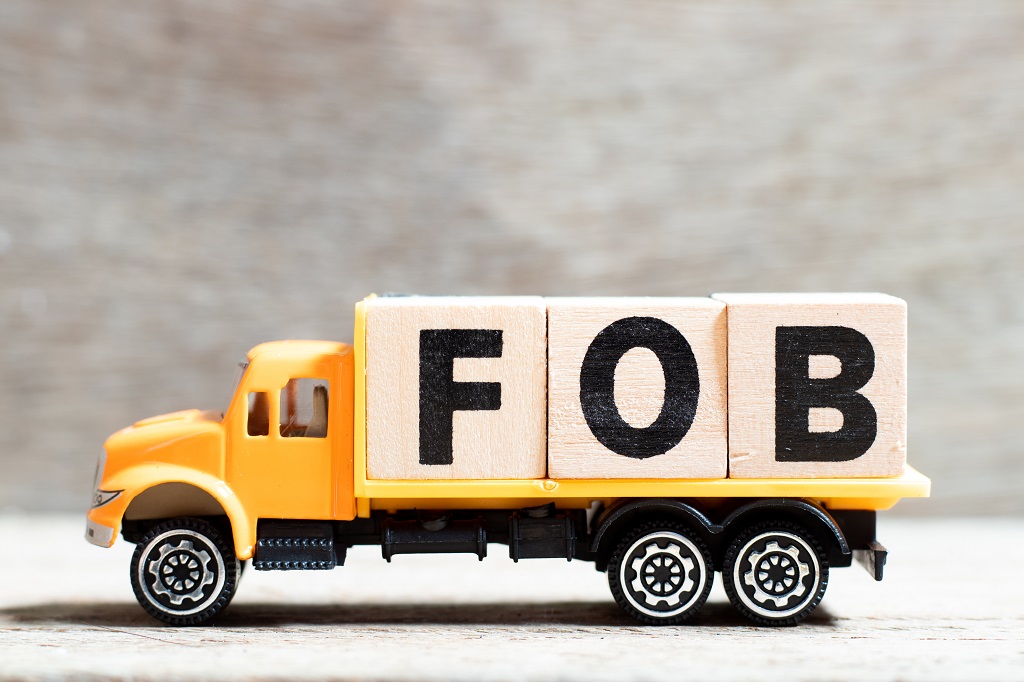When it comes to global trade, the term FOB appears on contracts, invoices, and shipping documents—but what does FOB really mean?
FOB, short for Free On Board, is a shipping term that defines when ownership, risk, and cost shift from the seller to the buyer. In this guide, you’ll learn how FOB works, how it impacts import expenses, and what to watch out for when using it.
What Does FOB Stand For in Shipping Terms?
FOB stands for Free On Board. It is one of the 11 Incoterms (International Commercial Terms) defined by the International Chamber of Commerce.
In practice, it answers two key questions:
- Who pays for shipping and insurance?
- When does risk transfer from seller to buyer?
Two Main FOB Types:
- FOB Origin (Shipping Point): Risk and cost transfer to the buyer as soon as goods are loaded onto the ship at the origin port.
- FOB Destination: Seller retains responsibility until goods reach the buyer’s port.
What Does FOB Mean in Export Trade?
In export scenarios, FOB specifies the point at which goods are legally delivered to the buyer.
Seller’s Responsibilities:
- Prepares and packages the goods
- Handles customs clearance in the exporting country
- Delivers goods to the designated port
- Loads them onto the vessel
Buyer’s Responsibilities:
- Pays for freight from port of origin
- Covers insurance, destination customs, duties, and local delivery
How FOB Influences Import Costs
The real financial impact of FOB becomes clear when you look at an importer’s expense sheet.
With FOB, Importers Must Pay:
- Sea freight
- Marine insurance
- Destination terminal fees
- Customs clearance and duties
- Inland delivery from port to warehouse
| Cost Type | Paid By |
|---|---|
| Factory to port fees | Seller |
| Port loading | Seller |
| Ocean freight | Buyer |
| Insurance | Buyer |
| Customs clearance (import) | Buyer |
| Inland transport | Buyer |
Understanding FOB in Business Contracts
In general business language, FOB determines the point of title transfer—when ownership shifts.
For example, a contract stating “FOB Shanghai Port” means:
Once goods are loaded onto the ship in Shanghai, the buyer bears all cost and risk—even if something happens mid-journey.
This clarity is essential for:
- Invoicing
- Insurance claims
- Legal disputes
Comparing FOB with Other Incoterms
Understanding how FOB compares to other terms helps businesses choose what fits their logistics needs:
| Term | Cost & Risk Transfer | Buyer Responsibility |
|---|---|---|
| FOB | At port of origin | Shipping onward |
| CIF | Includes freight + insurance | Destination port |
| DDP | Seller covers everything | Final delivery |
| EXW | At seller’s factory | Full chain after pickup |
What Does FOB Mean in Slang?
Interestingly, FOB also exists in pop culture and slang.
Slang Definition:
“Fresh Off the Boat” — refers to immigrants who are new to a country and may still retain strong ties to their native culture or language.
Example usage:
“He just moved here last month—still kinda FOB.”
Note: It can carry negative or mocking undertones, so use this slang with cultural sensitivity.
Why Importers Should Understand FOB Clearly
- Avoid disputes: Knowing when risk transfers can prevent legal headaches
- Plan better: Estimating your total import cost becomes easier
- Negotiate smarter: Choose who handles freight for best pricing
- Stay compliant: Customs documentation aligns better when Incoterms are clear
Mistakes Importers Make with FOB and How to Avoid Them
- ❌ Assuming seller handles shipping — if it’s FOB, you must book the freight
- ❌ Unclear port names — always specify (e.g., “FOB Shenzhen Port”)
- ❌ No insurance coverage — buy marine insurance separately
- ❌ Relying on emails — put all terms in formal contracts
✔️ Solution: Use official Incoterms language, get quotes for downstream logistics, and understand local import taxes.
GET IN TOUCH
Let us Send You a Quote
FAQs: FOB Meaning Simplified
- Q1. What does FOB mean for buyers?
- It means you take on risk and cost once the goods are loaded onto the ship.
- Q2. Is FOB cheaper than CIF?
- Initially, yes. But importers must cover more downstream costs.
- Q3. Can I use FOB for air freight?
- No. Use FCA (Free Carrier) for air or land transport.
- Q4. Do I need insurance with FOB?
- Yes, marine insurance is strongly recommended.
- Q5. What’s the difference between FOB origin and destination?
- Origin = Buyer takes risk once loaded. Destination = Seller retains risk until delivery.
- Q6. Is FOB used outside shipping?
- Yes, in general business contracts to define delivery and risk points.
Conclusion: Making Smarter Shipping Choices with FOB Knowledge
Understanding the FOB meaning in shipping can help you:
- Cut down unnecessary costs
- Reduce disputes with suppliers
- Gain control over your import process
Whether you’re a small business owner or logistics manager, knowing when responsibility shifts helps you protect your bottom line.
So next time you see “FOB” on a quote, you’ll know exactly what it means—and what you’re paying for.
